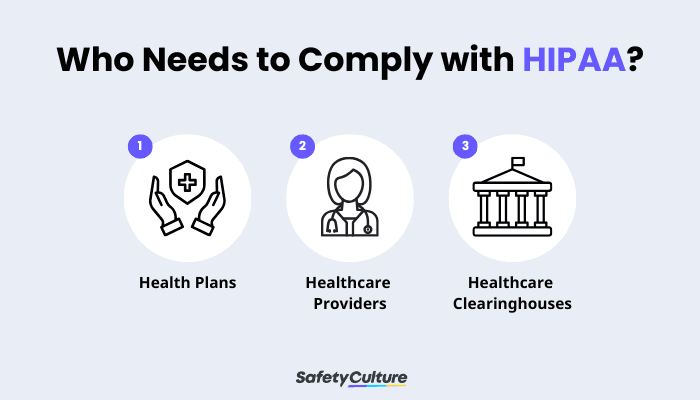HIPAA Compliance Training for Employees
Discover the pillars, importance, and key elements of effective HIPAA compliance training with our comprehensive guide.

Published 8 Jan 2025
Article by
6 min read
What is HIPAA Compliance Training?
The Health Insurance Portability and Accountability Act (HIPAA) is a law created to protect health information and establish confidentiality inside and outside health facilities. HIPAA aims to lessen costs, streamline administrative processes, and boost health information security. HIPAA compliance training is the key to making all of these possible.
This training educates healthcare workers on consent, patient rights, data security, and their roles and responsibilities as stated by the law. HIPAA training is enforced by the HIPAA privacy rule, which requires specific individuals and organizations to train employees on the policies and procedures needed to protect health information.
Importance
Data from the HIPAA Journal reveals that the healthcare information breaches from 2009 to 2023 led to the exposure of 519,935,970 healthcare records. With proper HIPAA compliance training, breaches like these are preventable.
HIPAA compliance training protects patients by equipping employees with the skills and knowledge necessary to:
Safeguard sensitive health information to ensure confidentiality
Permit appropriate access to protected health data in cases of legal exceptions
Act efficiently in case of data breaches and other related incidents
By keeping the distribution of sensitive health information on a “need to know” basis, patients and their personal information are kept safe from breaches and healthcare fraud.
Improve your GRC management
Simplify risk management and compliance with our centralized platform, designed to integrate and automate processes for optimal governance.
Who Needs to Comply with HIPAA?
According to the US Department of Health and Human Services, institutions and facilities that are required to follow HIPAA policies are called “covered entities.” These covered entities are divided into three categories:

Who Needs to Comply with HIPAA
Health Plans – This encompasses a variety of providers, including specific government programs that fund healthcare services, health insurance companies, health maintenance organizations (HMOs), and company health plans.
Majority of Healthcare Providers – These include most doctors, clinics, hospitals, psychologists, dentists, and even chiropractors, the majority of whom engage in business electronically.
Healthcare Clearinghouses – These act like middlemen for healthcare providers and health plans by converting nonstandard health information into standardized electronic format or data.
People and companies outside a covered entity who deal with or could be exposed to protected health information (PHI) also need to follow specific parts of the HIPAA regulations. These entities, known as “business associates,” include:
billing companies that handle healthcare claims;
outsourced lawyers and accountants; and
companies that manage the storage and destruction of medical records.
HIPAA Compliance Training Requirements
Three key rules must be followed to comply with HIPAA—the privacy rule, security rule, and breach information rule. When it comes to HIPAA training, it’s important to keep in mind that covered entities and business associates are expected to comply with the security rule, while only the former should comply with the privacy rule.
Privacy Rule Training
Every member of the workforce in a covered entity must be trained on the rules and policies surrounding PHI. Privacy training should be tailored to the specific procedures on the usage and disclosure of protected health data, as developed and implemented by the covered entity.
It’s important to note that privacy rule training should include all members of the workforce in a covered entity. This entails everyone from cleaning and maintenance staff to management, as they could be exposed to PHI unintentionally.
The privacy rule standard also requires comprehensive training. This means that employees are trained on all policies and procedures, regardless of whether it’s relevant to their function or not. This helps lessen the chance of violations in unusual cases that may be outside the scope of a worker’s regular functions.
The HIPAA compliance requirements for privacy rule state that training is required for new members of the workforce soon after they start. It’s also necessary to conduct training whenever there are changes in policies or procedures that may affect certain functions.
Privacy rule standard training can be quite ambiguous. Having HIPAA-compliant forms such as a privacy risk analysis checklist can help you organize training, avoid violations, and conduct internal reviews of guidelines and procedures.
Security Rule Training
The standard for security rule training is clear-cut. It’s the responsibility of covered entities and business associates to ensure that every employee is well-versed in security practices. This is done by implementing a security awareness and training program for everyone from top management to staff members.
In planning and implementing your own HIPAA-compliant security awareness training, four key areas need to be addressed:
Keeping security measures up to date
Setting up procedures for malware monitoring and protection
Keeping an eye on login attempts and reporting discrepancies
Establishing clear procedures for creating, changing, and protecting passwords
HIPAA emphasizes that security rule training should be ongoing and periodic evaluations must be conducted to determine whether requirements are fulfilled and up-to-date.
Training sessions are especially provided when there are advancements in technology, changes in work practices, or updates to rules and guidelines. It’s a good idea to leverage the use of a HIPAA compliance checklist to conduct risk assessments, identify gaps, and track if all provisions are being met.
Create your own HIPAA compliance checklist
Build from scratch or choose from our collection of free, ready-to-download, and customizable templates.
Topics to Cover
There are key elements that make up good HIPAA compliance training to ensure that covered entities and business associates understand their responsibilities in handling and safeguarding PHI. Here are some important topics to include in HIPAA training:
HIPAA overview – It’s important to start with establishing a clear understanding of the purpose and scope of HIPAA and the three rules for protecting PHI.
Definition of PHI – Ensure that employees understand what constitutes PHI and why there’s a need to safeguard it.
Minimum necessary standard – Tackle guidelines on limiting the use and disclosure of PHI on a “need to know” basis.
Privacy rule requirements and patient rights – Help employees understand what patients can do with their health information and orient them about the authorization process for the use and disclosure of PHI.
Security topics – Train the workforce on implementing and following security measures to protect electronic health information.
Business associate agreements – It’s necessary to cover the obligations and responsibilities that come with working with third-party entities that handle PHI.
Emerging issues and updates – During periodic training, it’s important to tackle current issues and new developments that may impact work practices.
How to Conduct HIPAA Training with a Digital Tool
Creating your own HIPAA training from scratch can be tedious and time-consuming, particularly for the fast-paced nature of the healthcare industry. However, it’s possible to make the process easier through platforms or organizations designed to audit and provide HIPAA compliance certification to workforces from covered entities and business associates.
Digital training platforms like Training by SafetyCulture do the brunt of the work by creating effective training that transforms technical standards into interactive, bite-sized training that your team can easily complete in minutes. That’s not all—you can also reward team members with customizable certificates, making them more motivated to complete their HIPAA training quickly and accurately.
Safeguard Healthcare Information with SafetyCulture
Why Use SafetyCulture?
SafetyCulture is a mobile-first operations platform adopted across industries such as manufacturing, mining, construction, retail, and hospitality. It’s designed to equip leaders and working teams with the knowledge and tools to do their best work—to the safest and highest standard.
Promote a culture of accountability and transparency within your organization where every member takes ownership of their actions. Align governance practices, enhance risk management protocols, and ensure compliance with legal requirements and internal policies by streamlining and standardizing workflows through a unified platform.
✓ Save time and reduce costs ✓ Stay on top of risks and incidents ✓ Boost productivity and efficiency ✓ Enhance communication and collaboration ✓ Discover improvement opportunities ✓ Make data-driven business decisions
Article by
SafetyCulture Content Team
SafetyCulture Content Contributor, SafetyCulture
View author profileRelated articles
Health
Medical Assessment

Achieving Zero Blood Culture Contamination
Learn what blood culture contamination is, why it occurs, and proven strategies to prevent false-positive results.
Health
Medical Assessment

A Guide to Celebrating Medical Laboratory Professionals Week
Find out what Medical Laboratory Professionals week is, its history, and different ways companies can celebrate it.
Health
Medical Assessment

A Guide to Efficient Veterinary Practice Management
Learn what veterinary practice management is, why it’s important, and its key aspects.